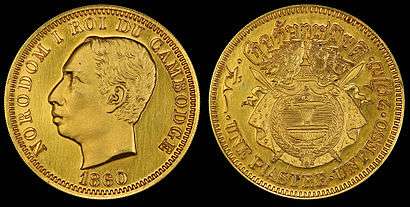Norodom of Cambodia
Norodom (Khmer: នរោត្តម pronounced [nɔː.roːt.tɑːm], French: Norodom Ier), born Ang Voddey (Khmer: អង្គវតី pronounced [ʔɑŋ.ʋɔ.ˈtəj]) (3 February 1834 – 24 April 1904), was the King of Cambodia from 1860 to his death in 1904. He was the eldest son of King Ang Duong and was a half-brother of Prince Si Votha and King Sisowath. In 1863, he invited French protection to fend off Annam and Siamese agressions. He would not be crowned king until 1864 in Bangkok due to missing royal artefacts. He has been credited with saving Cambodian sovereignty, but the country would remain under French rule for almost a century. His reign of 43 years and 188 days is the longest in the modern era. He was succeeded by his brother after his death.
| Norodom | |
|---|---|
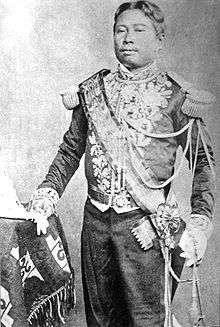 | |
| King of Cambodia | |
| Reign | 19 October 1860 – 24 April 1904 |
| Coronation | 3 June 1864 |
| Predecessor | Ang Duong |
| Successor | Sisowath |
| Born | Ang Voddey 3 February 1834 Angkor Borei, Cambodia |
| Died | 24 April 1904 (aged 70) Khemarin Palace, Phnom Penh, Cambodia, French Indochina |
| Spouse | 47 |
| Issue | 61, including Norodom Yukanthor |
| House | House of Norodom |
| Father | Ang Duong |
| Religion | Theravada Buddhism |
When he was born, Cambodia was threatened by Siam and Annam. However his father, King Ang Doung had closely relation with the Royal Farmily of Siam at Bangkok. His father sent him to study in Bangkok, where he studied Thai language, politics, military, Buddhist scriptures and the ancient Pali language.
Name
Norodom's royal name was Norodom Prohmbarirak (Khmer: ព្រះនរោត្ដម ព្រហ្មបរិរក្ស), previously, Ang Reacheavoddey (Khmer: អង្គ រាជាវតី). He is referred to as Ang Voddey in some Western accounts. His posthumous title is Preah Karuna Preah Sovannakaot (Khmer: ព្រះករុណាព្រះសុវណ្ណកោដ្ឋ).
Rule
Background: Cambodia from Ang Em to Ang Duong
King Norodom's grandfather, King Ang Eng, died in early 1797.[1] He left four sons, of whom the eldest, Ang Chan, became king, but as Chan was a minor on his father's death his coronation was delayed until 1806, when he turned 16.[1] Chan quarreled with his overlord the king of Siam (Thailand) and with his brothers, and the remainder of his reign was filled with wars between Chan's new overlord, the emperor of Vietnam, and the Thais, fought largely in the territory of Cambodia. Chan died in 1834, but the wars continued until 1847 when they ended with a peace treaty between Siam and Vietnam under which Chan's youngest brother, Ang Duong, was recognised as king. (The other two brothers were dead by this time). Ang Duong's reign, from 1848 (the year of his coronation, although his reign began in 1847 and he had claimed the throne even earlier) until his death in 1860 did much to restore the country, which had suffered much in the previous three decades.
Norodom's early life
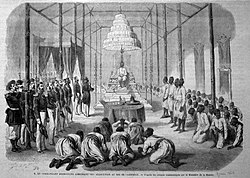
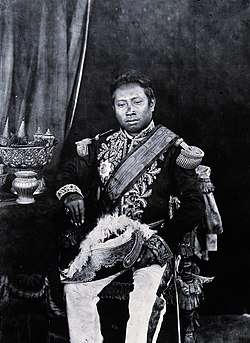
Norodom was the eldest son of Ang Duong. In 1850, he and his half-brother Prince Sisowath were sent to study in Bangkok by their father Ang Duong, where they grew up in close proximity to members of the Siamese royal family. In 1857, Norodom (Prince Phrom Borirak) served in the Royal Siamese Army as a military adviser, for which later he was awarded the Order of the White Elephant.
In 1860, when King Ang Duong died, Norodom became his successor but remained uncrowned because the Siamese royal court refused to release the Cambodian royal regalia. Therefore, he was unable to be crowned as the rightful successor.
At the same time, there was a major rebellion in Kampong Cham province by the Cham minority group. In 1862, Norodom lost control over the region, abandoned the capital of Oudong, and fled to safety in Battambang. He later left Battambang and went into exile in Bangkok. Seeing that the Siamese and Vietnamese overlords had gotten Cambodia into civil strife over Cambodia, in 1863 Siamese royal court decided to appoint Norodom as the puppet king of Cambodia. The Siamese court allowed Norodom to reside in Battambang, where the area was under Siamese hegemony. On July 15, 1867, the French forced Siam to cede Outer Cambodia to France by signing a treaty, the Siamese court accepted the terms made by France because of France's better equipped military, the French also forced King Norodom to return to Oudong in 1867 and sign a treaty of protection with France. This transferred the possession of Outer Cambodia from the Siamese and placed it under French colonial rule. Cambodia thus became an independent French protectorate and maintained a high degree of autonomy.
With Cambodia a French protectorate, the Siamese royal court agreed to send the royal regalia and let Norodom be crowned king under the French protectorate. In 1868 Norodom was crowned again, the coronation being supervised by the French officials. Nonetheless, the young king began his rule over a country in civil turmoil. However, the country was weak and subject to the power struggles between France and Siam. Not only were there rebel groups intent on driving out the Siamese, Vietnamese, and French out of Cambodia, but also bandit groups.
Nonetheless, in 1884, France took control of Laos and overran Vietnam. France and Siam entered into the Franco-Siamese War (1893) over Laos, ending with a treaty ceding Laos to France after the French blockade of Bangkok. In 1907, Siam ceded Inner Cambodia which included Battambang and Siem Reap, its last claim in Cambodia after continued pressure from France in exchange for Trat and Chanthaburi.
French protectorate
On 17 June 1884, French authorities forced King Norodom to sign a treaty which consolidated their position in Cambodia by forcing him to give up control of public revenue, customs taxes and public works. Norodom resisted but with French gunboats anchored outside the Royal Palace he had no choice but to sign. The French actions cause widespread anger throughout the country. In 1885 Prince Si Votha, Norodom's half brother, led a revolt against the French rule. The French suspected that Norodom was secretly supporting Si Votha's actions and blamed him for inciting the revolts. The revolt ended when the Cambodians were assured by King Norodom that the French had offered concessions to him. After the restoration of the 1885-1886 revolt, Norodom was in a position of temporary strength. To prevent another revolt, the French was less inclined to force the king to the wall once more.
Following the Sino-French War (1884–1885), French Indochina was formed in October 1887 from Annam, Tonkin, Cochinchina (who together form modern Vietnam) and the Kingdom of Cambodia.
For the remainder of his rule, Norodom was a puppet of the French. Before he died in 1904, he appointed his son, Prince Norodom, as heir apparent to the throne. But Yukanthor had a fall-out with the French and did not succeed to the throne. Norodom died in the palace in Phnom Penh in April 1904; his body was cremated in the traditional Buddhist fashion in 1906. He was succeeded by his half-brother Sisowath.
Reforms
Throughout Norodom's reign, several administrative and judicial reforms were improved in the kingdom. The reduction of provinces were imposed to help reduce administrative costs. He also followed King Chulalongkorn and abolished commercial monopolies, slavery, and civil lists for the royal family. During his reign, certain agricultural products such as betel, pepper and sugar costs were reduced.
Legacy

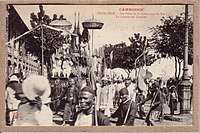
King Norodom was remembered for his appreciation and fondness of the arts. It was under his supervision that the Silver Pagoda was built in 1892, as well as Wat Oudong consecrated on 6 June 1875. When Norodom assumed the throne in 1860, classical dance recovered some of its ancient prestige, and soon became a great honour for court officials, ministers and senior dignitaries to have their children admitted to the palace's school of dancing.
In 1872, Norodom went on an official visit to Hong Kong, Manila and Singapore. In Manila, the King was greatly impressed by the music skills of the Filipinos and decided to take some musicians back to Cambodia to teach modern music. Norodom's generosity began drawing artists from many nationalities to Cambodia and they were always given a warm welcome at royal palace and court. Most of them had a deep interest in the Royal Ballet and thus were given every opportunity to learn Khmer music and dance.
Under King Norodom, the beginnings of the Royal Khmer Navy was established for territorial protection.
Honours

_ribbon.svg.png)
References
- Chandler 2018, p. 143.
- Chandler, David (2018). A History of Cambodia. Routledge.CS1 maint: ref=harv (link)
- Encyclopædia Britannica.com
- Milton E. Osborne, The French Presence in Cochinchina and Cambodia
Norodom of Cambodia House of Norodom Born: February 1834 Died: 24 April 1904 | ||
| Regnal titles | ||
|---|---|---|
| Preceded by Ang Duong |
King of Cambodia 1860 – 1904 |
Succeeded by Sisowath |
